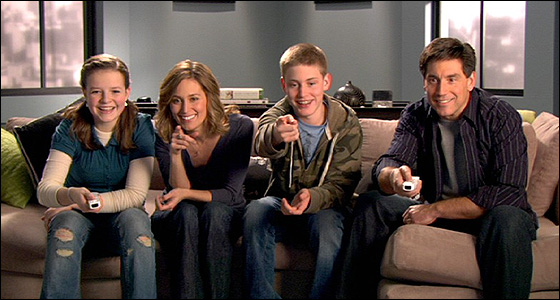Celebrity in the Games Industry: We’re Worth It
October 15th, 2008

I was watching the latest Bonus Round last week, and at the conclusion of the show they brought to mind something that piqued my interest. That is celebrity status in the games industry and how developers are finally being treated the way that they deserve to be; as rockstars.
It then occurred to me that it doesn’t just end with developers. Indie developers, game writers, fan artists, bloggers, comic artists, critics, amatuer video producers are all now becoming celebrities, even within their collected societies. Celebrity in games is taking off and at a rapid pace.
My next realization was that only three to four years ago the games industry wasn’t really like this at all. Developer diaries, interviews and commentaries were rare, there was no such thing as a game critic let alone games bloggers. The only celebrity that existed back then were the greats like Will Wright and Shigeru Miyamoto and despite their stature, they could hardly be regarded as celebrity, they were just professionals at what they do.
I think that a great deal of this change can be attributed to the growth of the internet. With faster connections speeds we can now download an interview and witness the personality of developers instead of just seeing their name and a small photo in a print magazine. There is also the rise of content distribution which has created an upsurge in content creators versed in the gaming niche, giving names to people like Gabe and Tyco, Ben Croshaw and The Angry Video Game Nerd. And with that blogging, in all its trendiness, providing a platform for a new wave of games writing thanks to writers like Stephen Totilo, N’gai Croal who are soaking up this new life of gaming celebrity. Then there’s podcast, social media and the rest of it, I’m sure you catch my drift.

The great thing about the birth of gaming celebrity is that thanks to the savage community that surrounds it, celebrity is often earnt, even if you play the anti-celebrity role such as Jack Thomson or perhaps even Dennis Dyack, you’ll need a thick hide to get there. The flipside to this is the manufacturing of celebrity which publishers have already been putting in motion since they first caught taste of gaming celebrity. I guess the developer diaries are in some ways a form of brand establishment for the developers, sometimes this can be difficult to decipher though, other times it is blatently obvious. Other methods of forced entry in gaming celebrity include Alison Carroll.
While Alison Carroll is great to look at, I’m sure that we can all distinguish the differences between money spinners like her and movers-and-shakers such as Jonathan Blow and Jason Rubin. The fact that so much celebrity stems from worthwhile discussion is only positive for the industry.
With games celebrity increasing at a consistently high rate, I don’t think that it’ll be too long before articles like this one become standard or at least a little more popular. Considering the effort that goes into the game development process this can only provide positive recognition to the people that deserve it.
Link Out (12/10/08)
October 12th, 2008

The past few weeks I seem to be sectioning between days with no time on my hands to days with perhaps too much free time. It’s all pretty random, so in the downtime I’ve been chipping away at some articles and doing plenty of reading because I know, before too long, I’ll be back in the cycle again.
Whatever the case may be I seem to have more time on my hands over here, which is great. This means that the quality of links for this month are top notch. Here’s what I have enjoyed lately:
The Needles: The Russians Are Coming! – The Escapist
This editorial should be read in tango with my Culture Bred Through Game Design article as it’s a sarcastic take on the cultural convenience of using Russians as the default video game villains. Despite the humour of the article, I find the observation to be an intriguing one. Been planning on writing about “cultural convenience” for a while.
Reality Bytes: Eight Myths About Video Games Debunked
There aren’t many thinkers in the industry, particularly ones that managed to tie together games and some significant discipline of study, which is why I am happy to plug almost anything that Henry Jenkins writes about games. Take a read.
Coming Home – Sexy Video Game Land
I don’t think that I’ve ever linked out to Leigh Alexander before which is a pity because I enjoy most of the stuff she writes, it’s all very melt-in-your-mouth writing. This post talks about the conclusive state of mind gamers place themselves in before we even have a chance to play. The quotes at the end nail the point beautifully.
Metal Gear Solid 4 spite – GameSpite
There’s been a whole pile of new writers on GameSpite lately and I’m not too sure that If I like them or not. In anycase, the critiques are still pretty solid, as was the case with this one. Some good points made, still not enough to mend the shitstorm that blew in come review time. Some of the points tie in with what I wrote here too.
TGS: Square Enix’s Wada: Japanese Industry Has ‘Lost Its Position’
The first step to fixing a problem is admitting that it exists and Yoichi Wada just did. Asian cultures seem reluctant to change, his acknowledgment is a good place to start.
Masochistic? [Too Human] – Consolation Prize
The account here is interesting. Basically it’s all about the affinity that builds up between you and the game when you are forced to teach yourself how to play. The effort invested in the game ultimately makes it harder to hate the title because you become more aware of what it was trying to do, even if it didn’t do it properly in the first place.
Greater than the (Riemann) Sum of Its Parts?
I must confess, I love this blog and have been backlogging on articles I missed for the early on. Richard’s approach is simple; everything can be broken down into smaller parts, hence by dismantling games we can better understand why they are good or bad. It’s common sense genius that doesn’t exist in this industry. So go forth, learn!
Feel the Magic
October 10th, 2008

The other day I was reminiscing with my brother about our childhood as wide-eyed, avid game fans. Back then gaming seemed to possess this wonderfully infectious energy about it that saw you and all your friends enchanted by its very greatness.
My brother then asked me if games were still this magical today, and I think it is. The only difference between now and then is that now I’m older, and have a greater understanding of everything that is going in within the industry, hence the excitement of the unknown has somewhat faded. Where as being a child, in a time before internet, you could only know as much as your surroundings would let you.
I don’t think that the magic has wanned and I don’t plan on going to go all starry-eyed and talk about the “good old days”. No doubt there are certain generations or time periods in the history of games which I prefer over others, but overall we’ve run a pretty steady trek. It’d be hard to waiver one time being significantly more better than another.
Despite the evenness of our history, I can’t deny it, there is a magic to familiarizing yourself with something new. When you slowly begin to make sense of the experience for the first time there is this uplifting feelings that fills up inside you. No doubt many of us who have played games for a long time, experienced this feeling as kids. I guess you could say that we had this feeling during our gaming prime. So hold that thought for a moment and let’s think about these guys:

All those Mums, Dads, Aunties, Uncles and the elderly that are now traversing their gaming prime, going through that same experience like us for the first time thanks to developers like Nintendo and PopCap Games.
We might all be too brute to acknowledge it but we were all beginners at one stage or another. We all started off playing fairly privative, simplified games and yes we didn’t like the feeling of others who were better at it than us but we endeavored and here we are. These new people coming into the market are no different from us 10, 15, 20 years ago when our fascination piqued. They too are now settling into their gaming prime and I think that’s fantastic. So let’s try and encourage this rather phenomena than dismiss it.



 Game Design Companion: A Critical Analysis of Wario Land 4 - $7.99
Game Design Companion: A Critical Analysis of Wario Land 4 - $7.99 Level Design: Processes and Experiences
Level Design: Processes and Experiences Speed Boost: The Hidden Secrets Behind Arcade Racing Design - $5.99
Speed Boost: The Hidden Secrets Behind Arcade Racing Design - $5.99 Adventures in Games Analysis: Volume I - $5.99
Adventures in Games Analysis: Volume I - $5.99







